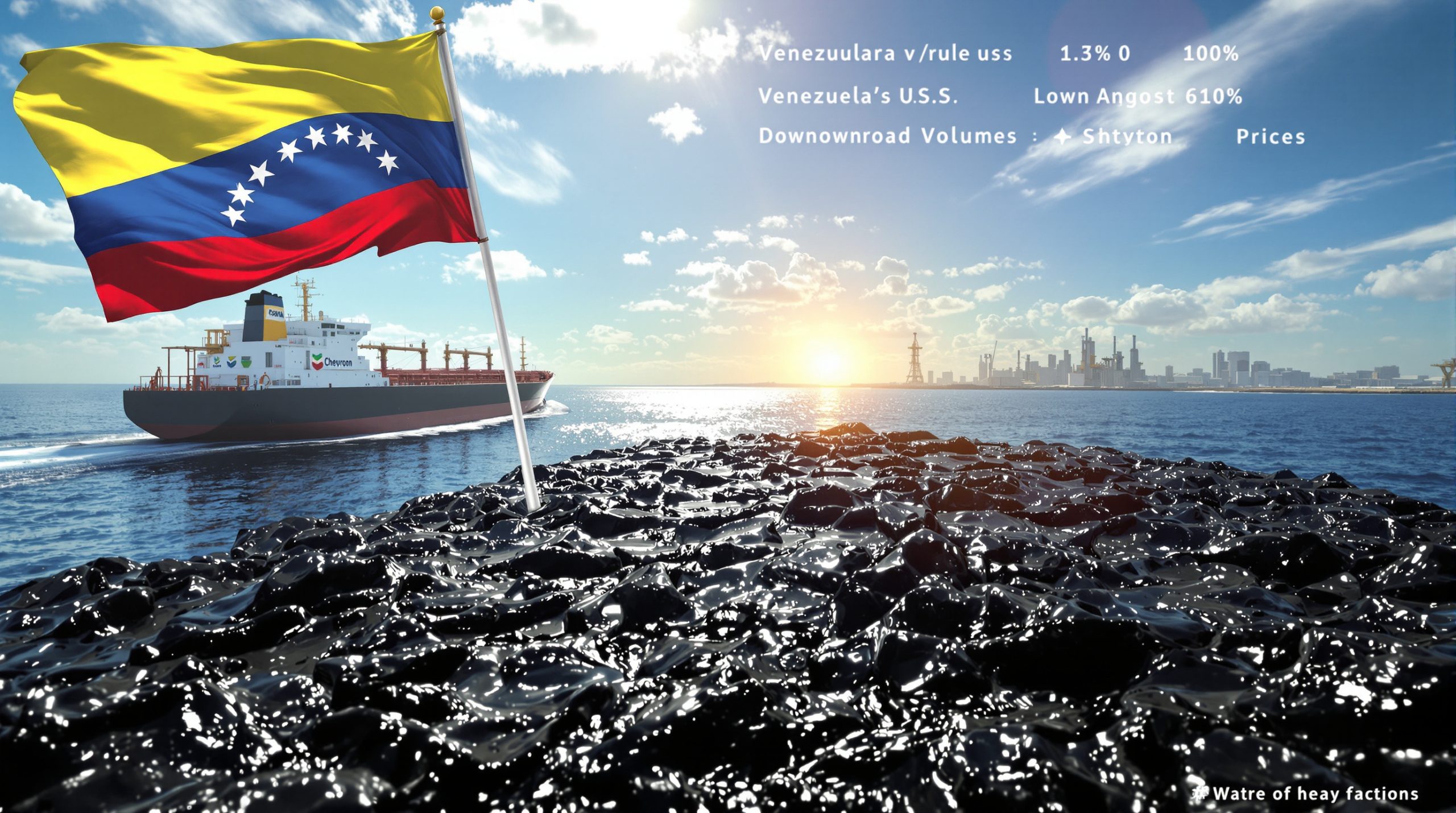Venezuelan Crude Oil on Its Way to the US: A New Chapter in Energy Relations
After years of sanctions and trade restrictions, Venezuelan crude oil is once again flowing toward US shores, marking a significant shift in the energy relationship between the two nations. This resumption of oil trade comes amid changing geopolitical dynamics and evolving energy market conditions that have prompted a recalibration of US policy toward Venezuela's oil sector.
The return of Venezuelan oil to American refineries represents not just a commercial transaction, but a complex realignment of energy relationships with far-reaching implications for both countries and global markets.
The Current Status of Venezuelan Oil Exports to the US
Venezuelan crude shipments are currently being loaded onto tankers bound for US refineries, representing the first substantial oil trade between the countries since sanctions were eased. Major energy companies, including Chevron which has chartered specific tankers for Venezuelan crude transportation, have begun securing vessels to transport Venezuelan heavy crude varieties.
These heavy crude varieties are particularly well-suited for certain US Gulf Coast refining operations that were specifically designed to process this type of oil. The resumption of shipments provides these refineries with access to the exact crude slate they were engineered to handle most efficiently.
Timeline of Recent Developments
US authorities have issued specific licenses allowing selected companies to resume limited oil trade with Venezuela, creating a regulatory framework for controlled commercial engagement. These licenses contain strict conditions regarding payment mechanisms and operational parameters.
Initial shipments are being arranged through authorized channels with regulatory oversight to ensure compliance with remaining sanctions provisions and policy objectives.
The volume of initial shipments remains modest compared to historical trade levels, with expectations for gradual increases as operational and logistical systems are reestablished.
Several major energy corporations are positioning themselves to participate in this reopened trade route, recognizing the strategic value of Venezuelan heavy crude for their refining operations.
How Did US-Venezuela Oil Relations Evolve?
Historical Context of US-Venezuela Oil Trade
For decades, Venezuela was one of America's most reliable oil suppliers, with a relationship dating back to the early 20th century. At its peak, Venezuela exported approximately 1.5 million barrels per day to the United States, making it one of the top sources of US crude imports.
The relationship was symbiotic – Venezuela needed the revenue from oil exports, while US refineries, particularly those along the Gulf Coast, were specifically designed to process Venezuela's heavy, high-sulfur crude varieties. These refineries made substantial capital investments in specialized equipment precisely calibrated for Venezuelan crude characteristics.
This deep integration of refining infrastructure created a natural market preference that persisted through various political and economic cycles, until it was disrupted by sanctions.
The Sanctions Era and Trade Disruption
The once-robust energy partnership deteriorated significantly following political tensions and the implementation of comprehensive sanctions. These restrictions effectively halted the flow of Venezuelan crude to US refineries, forcing both sides to seek alternative arrangements.
US refiners pivoted to other sources of heavy crude from Canada, Mexico, and elsewhere, often at higher transportation costs and with less optimal crude slates for their equipment configurations.
Venezuela redirected exports primarily to Asian markets, often at significant discounts sometimes reaching $30 per barrel below market prices due to complications with shipping, insurance, and banking restrictions.
The sanctions contributed to a dramatic decline in Venezuela's oil production decline, which fell from approximately 2.4 million barrels per day to under 700,000 barrels per day at its lowest point.
US Gulf Coast refineries had to adapt operations to accommodate different crude slates, often with reduced efficiency and higher operating costs that affected their competitive position.
Recent Policy Shifts and Diplomatic Developments
Several factors have contributed to the current thaw in oil relations:
Evolving geopolitical priorities in response to global energy market disruptions have prompted a reassessment of the effectiveness and impact of comprehensive sectoral sanctions.
Diplomatic engagement aimed at addressing humanitarian concerns in Venezuela has created pathways for conditional economic activities in strategic sectors.
Recognition of the specialized nature of certain refineries designed for Venezuelan crude has highlighted the economic inefficiency of forcing these facilities to process sub-optimal feedstocks.
Strategic considerations regarding global energy security and supply diversification have gained prominence amid volatility in international markets and supply chains.
What Makes Venezuelan Crude Oil Unique?
Characteristics of Venezuelan Heavy Crude
Venezuelan oil possesses distinctive properties that make it both challenging and valuable:
Exceptionally high density with API gravity typically ranging between 8-15 degrees, compared to light crude varieties that might exceed 35 degrees API. This extreme density makes it among the heaviest commercial crude oils in the world.
High sulfur content often exceeding 2.5% by weight requires specialized refining processes and environmental controls to manage emissions during processing.
Rich in valuable heavy molecules that yield premium products like specialty asphalt, lubricants, and petrochemical feedstocks when properly refined through complex processing chains.
Contains higher concentrations of metals, particularly nickel and vanadium, that require specialized catalysts and equipment to prevent contamination and catalyst poisoning during refining.
Specialized Refining Requirements
The unique composition of Venezuelan crude necessitates specialized refining infrastructure:
Complex coking and hydrocracking units to break down heavy molecules cost billions to construct and require specific operational expertise to run efficiently.
Enhanced desulfurization capacity to meet environmental standards adds significant capital and operating costs that only make economic sense with consistent access to heavy sour crude feeds.
Catalytic systems designed specifically for heavy oil processing use proprietary technologies and materials engineered for the precise molecular composition of Venezuelan crude varieties.
Significant capital investment in specialized equipment and processes creates a substantial barrier to entry and explains why only certain refineries can efficiently process this type of crude.
Strategic Value to US Refineries
Several US refineries maintain a competitive advantage in processing Venezuelan crude:
Gulf Coast facilities with heavy oil processing capabilities can extract maximum value from Venezuelan crude, producing higher-margin specialty products that lighter crude processors cannot match.
Operational efficiency improves when running the crude grades they were designed for, with some facilities reporting up to 15% better margins when processing their optimal crude slate.
Transportation logistics from Venezuela to the US Gulf Coast are relatively straightforward, with shipping times of approximately 5-7 days compared to 45+ days from alternative heavy crude sources in the Middle East.
Historical expertise in handling these specific crude varieties enhances operational performance, as refinery teams have developed specialized knowledge and procedures optimized for Venezuelan oil characteristics.
What Are the Market Implications of Venezuelan Oil's Return?
Impact on Global Oil Supply Dynamics
The reintroduction of Venezuelan crude to US markets occurs against a backdrop of evolving global supply conditions:
Current WTI crude prices hovering around $62.80, down 1.81% in recent trading, reflect broader market uncertainty about supply-demand balance and economic growth projections.
Brent crude trading at approximately $65.85, showing a 1.48% decline, indicates similar concerns in international markets despite potential supply constraints.
Natural gas prices moving in the opposite direction, up 2.64% to $2.916, highlight the complex interrelationships between different energy commodities and their sometimes divergent market drivers.
OPEC production impact creating additional market uncertainty have heightened the value of non-OPEC supply sources like Venezuela that operate outside the production quota system.
Effects on US Refining Operations
The availability of Venezuelan crude offers both opportunities and challenges for US refiners:
Potential operational improvements for facilities designed to process heavy sour crude could enhance refining margins by $2-4 per barrel according to industry analysts, though actual figures vary by facility configuration.
Diversification of supply options in a volatile global market reduces dependency on any single source region and improves negotiating leverage with suppliers.
Possible margin enhancements for refiners with appropriate processing capabilities come from both improved operational efficiency and better yields of high-value products.
Adjustments needed after years of operating without this traditional feedstock include recalibration of operating parameters, blending strategies, and product slate optimization.
Competitive Positioning in International Markets
The resumption of this trade relationship has broader implications:
Shifts in crude flow patterns as Venezuelan oil redirects from Asian markets could create ripple effects in global trade routes and pricing relationships between regional markets.
Potential pricing effects on similar heavy crude grades from Canada and Mexico may emerge as competition increases for refining capacity specialized in processing heavy oil varieties.
Adjustments in shipping routes and transportation economics could affect tanker rates and availability, particularly in the Caribbean and Gulf regions where shipping capacity is sometimes constrained.
Recalibration of global heavy crude differentials and pricing relationships will likely occur gradually as markets adapt to the reintroduction of Venezuelan barrels into traditional trade patterns.
How Are Energy Companies Responding?
Major Players Positioning for Venezuelan Crude
Several significant energy corporations are actively engaged in the resumption of Venezuelan oil imports:
Chevron has chartered tanker for Venezuelan crude, demonstrating concrete commitment to reestablishing this trade flow through tangible logistical investments.
Other international energy majors are evaluating participation opportunities, assessing both commercial potential and compliance requirements before making definitive commitments.
Trading companies are establishing logistics chains to facilitate movements, including banking arrangements, shipping contracts, and quality verification systems tailored to Venezuelan crude characteristics.
Service providers are repositioning assets to support renewed trade flows, from inspection services to terminal operations and transportation infrastructure.
Investment and Operational Strategies
Companies are implementing various approaches to capitalize on this development:
Selective refinery optimizations to accommodate returning crude varieties include reconfiguring processing units, adjusting catalyst formulations, and modifying blending systems to maximize value extraction.
Strategic sourcing adjustments to incorporate Venezuelan options involve rebalancing supply portfolios, renegotiating existing contracts, and developing contingency plans for supply disruptions.
Hedging and risk management adaptations for the evolving supply mix require new approaches to price exposure, quality differentials, and operational flexibility as market dynamics shift.
Logistical enhancements to efficiently handle the renewed trade flows encompass terminal capacity adjustments, inventory management strategies, and transportation network optimizations.
Regulatory Compliance Frameworks
Participating companies must navigate complex compliance requirements:
Adherence to specific license terms and conditions requires sophisticated tracking systems, documentation protocols, and regular communication with regulatory authorities.
Transparent reporting of all transactions and movements demands enhanced monitoring capabilities and clear audit trails for all commercial and operational activities.
Ongoing monitoring of policy developments and regulatory changes necessitates dedicated compliance teams with specialized knowledge of both energy markets and international sanctions regimes.
Implementation of robust compliance systems and controls involves significant investment in both technology and human expertise to ensure all activities remain within authorized parameters.
What Are the Geopolitical Considerations?
Regional Energy Security Implications
The resumption of US-Venezuela oil trade affects broader regional energy dynamics:
Potential stabilization effect on Caribbean and Central American energy markets could reduce price volatility and improve supply security for smaller economies heavily dependent on imported energy.
Shifts in regional refining and product flow patterns may create both opportunities and challenges for existing supply chains and distribution networks throughout the Americas.
Implications for neighboring oil producers like Mexico, Colombia, and Brazil include potential competition for market share and investment capital in the hemisphere's energy sector.
Possible ripple effects on regional pricing and supply availability could benefit energy-importing nations while creating new competitive pressures for alternative suppliers.
Global Strategic Energy Relationships
This development occurs within a complex web of international energy relationships:
Adjustments in global heavy crude trading patterns and pricing relationships extend far beyond the bilateral US-Venezuela relationship to affect market dynamics worldwide.
Potential impacts on other oil-producing nations' market strategies may include reconsideration of production levels, export destinations, and pricing mechanisms to maintain competitive positioning.
Implications for international sanctions policies and effectiveness raise questions about the evolving role of economic measures in achieving foreign policy objectives across multiple contexts.
Considerations for global energy security and supply diversification highlight the tension between geopolitical priorities and commercial energy market realities.
Future Policy Trajectory
The current oil trade resumption may signal broader policy evolution:
Potential for further calibration of energy-related sanctions could create new commercial opportunities while maintaining pressure for political and economic reforms.
Implications for diplomatic engagement on multiple fronts extend beyond energy markets to human rights, democratic governance, and regional stability considerations.
Possible framework for addressing other energy trade restrictions globally might emerge from the Venezuelan crude oil US market experience, potentially influencing approaches to other sanctioned oil producers.
Indicators of evolving approaches to energy security and international relations suggest a more nuanced balancing of ideological principles with practical energy market realities.
What Does This Mean for Energy Markets Going Forward?
Short-Term Market Adjustments
Immediate market responses are likely to include:
Recalibration of heavy crude differentials and pricing relationships as traders adjust to new supply options and competition among similar crude grades intensifies.
Adjustments in shipping rates and transportation logistics, particularly in the Caribbean and Gulf regions where tanker availability and port capacity sometimes constrain movements.
Potential shifts in refinery crude slates and operational parameters as facilities optimize their feedstock mix to incorporate returning Venezuelan barrels where economically advantageous.
Trading and hedging strategy adaptations by market participants responding to new price relationships and quality differentials in the heavy crude segment.
Medium-Term Supply Chain Implications
Over the coming months, broader supply chain effects may emerge:
Gradual reintegration of Venezuelan crude into established trading patterns will likely occur incrementally as logistical systems and commercial relationships are rebuilt.
Potential production increases in Venezuela if investment conditions improve could add meaningful volumes to global supply, though technical constraints will limit the pace of recovery.
Adjustments in competing heavy crude producers' marketing strategies may include pricing changes, quality enhancements, or transportation incentives to maintain market share.
Evolution of refinery optimization approaches as supply options expand will drive operational adjustments and potentially capital investments to maximize value from available crude slates.
Long-Term Strategic Considerations
The longer-term implications could be substantial:
Potential for Venezuela to rebuild production capacity with technical assistance represents a significant opportunity to restore output toward historical levels exceeding 2 million barrels per day.
Possible reconfiguration of global heavy crude supply chains could reshape trading patterns, pricing relationships, and refinery investment decisions over a multi-year horizon.
Strategic investments in specialized refining and transportation infrastructure might be justified by sustained access to economically advantageous Venezuelan crude supplies.
Evolution of energy security policies and international trade frameworks may incorporate lessons from this experience regarding the effectiveness and impacts of sectoral sanctions.
How Might Venezuelan Production Evolve?
Current Production Capabilities
Venezuela's oil sector faces significant challenges after years of underinvestment:
Production levels remain well below historical capacity, with current output estimated at approximately 750,000-800,000 barrels per day compared to peak levels exceeding 3 million barrels per day.
Infrastructure deterioration limits near-term growth potential, with issues ranging from wellhead equipment failures to pipeline integrity problems and terminal limitations.
Technical expertise gaps constrain operational improvements following the departure of many experienced personnel during the industry's contraction.
Financial constraints impact maintenance and development activities, with limited access to capital markets and restricted revenue flows hampering reinvestment.
Rehabilitation Potential and Challenges
Restoring Venezuela's production capacity would require:
Substantial capital investment in field development and infrastructure estimated at $10-15 billion annually over multiple years to achieve meaningful production growth.
Technical expertise and technology transfer, particularly in enhanced oil recovery techniques appropriate for Venezuela's challenging reservoir conditions.
Workforce development and capability building to replace lost technical and managerial expertise essential for efficient operations.
Stable regulatory and fiscal frameworks to attract investment, including clear contractual terms and protection for foreign partners' interests.
Scenarios for Future Development
Several potential pathways exist for Venezuela's oil sector:
Gradual rehabilitation focused on highest-potential assets could target an initial production increase of 200,000-300,000 barrels per day within 12-18 months of sustained investment.
Targeted international partnerships for technical and financial support would likely concentrate initially on existing fields with established reserves and infrastructure.
Phased approach to infrastructure modernization and expansion would prioritize critical export systems and processing facilities to maximize revenue generation capability.
Development of improved operational and management systems represents a necessary foundation for sustainable production growth and efficient resource utilization.
What Should Investors and Market Participants Watch?
Key Indicators to Monitor
Those tracking this developing situation should focus on:
Regulatory announcements regarding sanctions policies and licenses provide critical parameters for commercial engagement and legal compliance.
Vessel tracking data showing actual crude movements offers concrete evidence of implementation beyond policy statements and intentions.
Refinery operational adjustments and crude slate changes indicate the commercial impact and adoption rate of returning Venezuelan crude supplies.
Price differentials between comparable heavy crude grades reflect market valuation of Venezuelan oil and competitive positioning among similar products.
Potential Market Opportunities
The evolving situation may create various opportunities:
Trading strategies leveraging changing crude differentials could generate significant value for market participants with deep understanding of quality relationships and processing economics.
Refining margin enhancements for appropriately positioned operators may improve financial performance for companies with Venezuelan crude-compatible facilities.
Service and equipment provision for rehabilitation efforts represents a substantial market for oilfield service companies with relevant technical capabilities and experience.
Transportation and logistics services supporting renewed trade flows create opportunities for shipping companies, terminal operators, and specialized service providers.
Risk Factors to Consider
Significant uncertainties remain that could impact outcomes:
Policy volatility and potential regulatory changes create compliance risks and commercial uncertainties that require careful monitoring and contingency planning.
Technical challenges in Venezuelan production recovery may delay or limit supply growth, affecting the availability and pricing of crude exports.
Market competition from alternative heavy crude sources could constrain pricing power and limit the economic advantage of Venezuelan supplies.
Geopolitical developments affecting international relations have potential to accelerate or reverse current policy directions with limited advance notice.
FAQ: Venezuelan Crude Oil Shipments to the US
Why is Venezuelan crude oil particularly valuable to certain US refineries?
Venezuelan heavy crude contains unique molecular compositions that, when processed in appropriately designed refineries, yield valuable products with favorable economics. Many
Want to Be Alerted About the Next Major Resource Discovery?
Discover potential market-moving ASX mineral announcements before the broader market with Discovery Alert's proprietary Discovery IQ model, delivering real-time insights on significant discoveries that could generate substantial returns. Explore historic examples of exceptional discovery outcomes on our dedicated discoveries page and position yourself ahead of the market.




